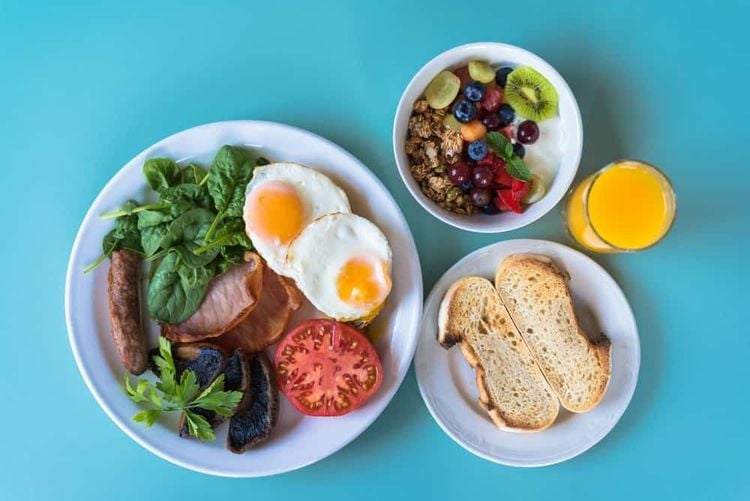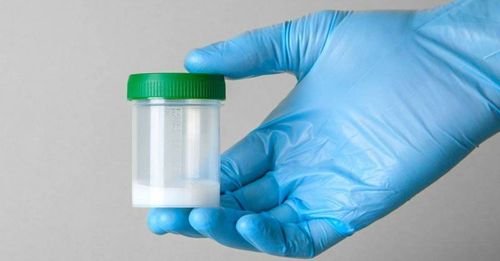Diet plays an important role in increasing your chances of conceiving and getting pregnant naturally. What should you eat to conceive easily? Beans, green leafy vegetables, nuts, foods rich in zinc, etc, are good choices for couples who are expecting a baby.
1. What to eat to conceive easily?
There are many causes of difficulty conceiving. These can be psychological stress, diabetes, hormonal disorders, unscientific living habits, etc. To avoid the negative effects of the above causes and speed up the conception process, couples should add the following foods to their daily diet:
- Beans: Women who eat a lot of vegetable protein from soybeans will conceive more easily. In addition, lentils, tofu, red beans, nuts containing vegetable protein, etc. also increase the chance of getting pregnant naturally;
- Green leafy vegetables: Dark green vegetables such as Malabar spinach, broccoli, spinach, kale, etc, help increase ovulation in women, making it easier to conceive. At the same time, they are also very good during pregnancy because they are rich in antioxidants, folic acid, and iron. Eating a lot of dark green vegetables also helps reduce the risk of anemia, preventing birth defects in the fetus. Men who eat a lot of dark green leafy vegetables also have healthier sperm, reducing the risk of miscarriage or genetic problems in the baby;
- Garlic: This is an answer to the question of what to eat to conceive easily. Garlic is rich in selenium - a mineral that helps sperm develop well increases the ability to conceive, and prevents early miscarriage. In addition, garlic also contains vitamin B6, which helps regulate hormones and improve the body's immune system;
- Fruits: Women who eat a lot of fruit are 3 times more likely to conceive than women who eat less fruit. Women with magnesium deficiency and difficulty conceiving should eat pineapple because it is a food that provides a lot of magnesium - a substance that plays an important role in the production of reproductive hormones. Berries such as blueberries, strawberries, raspberries, etc. are rich in antioxidants, vitamin C, vitamin E, folate, potassium fiber, etc., which help prevent the aging of egg cells. Bananas are rich in vitamin B6 - which helps produce hormones. Eating a lot of bananas helps the menstrual cycle to be regular and eggs to develop more healthily. In addition, bananas also help convert food into energy and create blood cells for the fetus, helping the baby have healthy skin and develop good eyesight;
- Nuts: Nuts, such as chestnuts, walnuts, almonds, and cashews, are very beneficial for the body. They contain monounsaturated fats, which help regulate insulin levels and may enhance fertility. Additionally, these nuts are rich in vitamin E, which is good for skin health. Pumpkin seeds are also advantageous, as they are high in iron, which is essential for hemoglobin production and can support women in conceiving naturally. Sunflower seeds are rich in zinc, which helps balance reproductive hormones, thereby improving the quality of women's eggs. Furthermore, sunflower seeds contain folate—a synthetic form of folic acid—beneficial for pregnant women and helpful in preventing birth defects.
- Olive oil: is a source of monounsaturated fat, increases insulin sensitivity and reduces inflammation throughout the body. This is important since inflammation can affect ovulation, conception, and embryonic development. Therefore, couples trying to conceive should consider incorporating olive oil into their daily meals in place of butter.

- Salmon: Cold-water fish such as salmon are rich in Omega-3 fatty acids, which help regulate reproductive hormones and increase blood flow to the reproductive organs. Not only that, salmon also has lower mercury levels than other types of fish. Every week, couples should eat salmon about 1-2 times to conceive quickly;
- Honey: Has many effects in increasing fertility and supporting the treatment of many other diseases. Honey is rich in amino acids and minerals, helping to increase sperm quality and improve the health of the uterus and ovaries. Women who are expecting a baby should drink a spoonful of honey mixed with cinnamon powder every day;
- Cinnamon: Has many health benefits such as helping to reduce insulin levels, prevent cancer, and increase ovulation rate. Couples can add cinnamon to fruit juice or eat cinnamon with meals;
- Zinc-rich foods: Foods rich in zinc such as marine animals (oysters, clams) or beans, radishes, guava, nuts, egg yolks, etc. all help improve sperm quality and help eggs develop better;
- Eggs: Research shows that people with a diet rich in protein and low in carbohydrates often have a higher pregnancy rate. Therefore, supplementing protein-rich foods such as egg whites will be very good for natural pregnancy;
- Milk: Whole milk is a good food for conception. Milk is a rich source of vitamin D, calcium, and phosphorus - substances that play an important role in the formation and development of the baby's bones;
- Whole wheat bread: This is a food containing complex carbs. When eating whole wheat bread, the body will take longer to digest (compared to bread made from refined flour). From there, keep blood sugar and insulin levels stable, increasing the ability to conceive;
- Red meat: This type of meat is rich in iron and vitamin B12, which helps prevent anemia and reduce the risk of infertility. Red meats such as goat, beef, pork, etc. are essential for the development of the nervous system. However, red meat should only be eaten in moderation.
2. Notes for couples planning to conceive naturally
When planning to conceive naturally, in addition to increasing the intake of foods that enhance fertility, couples should pay attention to the following:
2.1 Dietary Recommendations
Select a diet that maintains a healthy weight while promoting fertility and overall health, making pregnancy and childbirth easier.
Incorporate foods rich in antioxidants: Foods high in zinc and folate can significantly improve fertility for both men and women. Fruits, vegetables, and nuts are excellent sources of beneficial antioxidants, including vitamin C, vitamin E, folate, lutein, and beta-carotene.
Eat a full breakfast: Consuming a well-rounded breakfast can help reduce the risk of polycystic ovary syndrome (PCOS), which is a common cause of infertility.

- Avoid trans fats: Eating healthy fats helps boost fertility and overall health. Trans fats such as hydrogenated vegetable oils, some margarines, fried foods, processed foods, etc. should be avoided because they increase the risk of infertility due to their negative effects on insulin sensitivity;
- Stay away from stimulants: Alcohol, tobacco, coffee, sweets, etc. because they reduce sperm quality and reduce the ability to conceive;
Cut down on carbs if you have polycystic ovary syndrome: Following a low-carb diet is recommended for women with polycystic ovary syndrome. This helps maintain a healthy weight, reduces insulin levels, helps regular menstruation, and increases the ability to conceive; - Reduce refined carbs: Found in sugary foods and drinks and processed grains. These carbs are absorbed quickly by the body, causing a spike in blood sugar and insulin, which are similar to ovarian hormones, helping eggs mature. Accordingly, continuous high insulin can cause the body to reduce the production of reproductive hormones, affecting the ability to conceive;
- Eat more fiber: Fiber helps the body eliminate excess hormones, keeping blood sugar levels balanced;
- Change protein sources: Replace some animal proteins such as eggs, meat, fish, etc. with plant protein sources such as beans, nuts, and fish with low mercury content, etc. to reduce the risk of infertility;
- Supplement with multivitamins and minerals: Vitamins A, C, D, E, B2, potassium, zinc, copper, Pantothenic Acid, and Niacin.
- Maintain standard weight: Being overweight or underweight affects the ability to conceive naturally. Therefore, when wanting to have children, couples should pay attention to the issue of weight. The most ideal weight is the BMI (body mass index) fluctuating between 20 - 25. Being overweight will increase the risk of high blood pressure and gestational diabetes, even causing many other complications, so women need to pay attention to adjusting their weight accordingly;
- Have more sex: To increase the chance of conception, some positions in sexual activity also help sperm swim to the fallopian tubes more easily;
- Women should know their cycle: Women are more likely to conceive within 1 - 2 days after ovulation. Therefore, women should know their menstrual cycle to adjust the appropriate time for sex, increasing the chance of conception;
- Reduce psychological stress: If you put too much pressure on yourself, getting pregnant can be more difficult. Therefore, couples should keep a relaxed mood, and reduce stress and anxiety. Women can practice yoga, meditation, ... to relax and reduce stress;
- Increase exercise: Exercise brings many health benefits, including increased fertility. However, it is important to exercise moderately and not over-exercise;
General health check-up: If you have been trying to conceive for a long time but have not been successful, couples should go for a health check-up to check their reproductive health and ask for advice from a doctor to increase their chances of getting pregnant.

This article helps answer the question of what to eat to conceive easily. The above foods are all rich in nutrients, helping to increase the ability to conceive naturally, so couples should add them to their nutritional menu. At the same time, you should change your lifestyle positively and exercise properly to increase fertility and prepare your body for pregnancy.
In addition, to prepare for a healthy pregnancy, both husband and wife should have a reproductive health check-up 3-5 months before getting pregnant.
The wife should:
- Get vaccinated before pregnancy (especially rubella because rubella is extremely dangerous during pregnancy)
- Genetic testing to screen for genetic diseases before pregnancy
- Check for gynecological infections to avoid affecting the health of the mother and fetus
- Women over 35 years old who want to conceive (especially those who have never been pregnant) will have to have a very detailed health check because pregnancy at this age often has problems: ovarian failure, premature birth, higher risk of fetal malformations, placenta previa, and preeclampsia.
The husband should:
- Check reproductive health, detect diseases such as testicular atrophy, erectile dysfunction, weak sperm...
- Sexually transmitted diseases, especially incurable diseases, are extremely dangerous.
To arrange an appointment, please call HOTLINE or make your reservation directly HERE. You may also download the MyVinmec app to schedule appointments faster and manage your reservations more conveniently.
References: healthline.com, parents.com
Reference:
https://hellobacsi.com/mang-thai/chuan-bi-mang-thai/an-gi-de-de-thu-thai/
gref
https://suckhoedoisong.vn/12- Tuyet-chieu-de-nhanh-co-bau-n114221.html
https://www.healthline.com/nutrition/16-fertility-tips-to-get-pregrant
3.-Avoid-trans-fats
http://www.parents.com/pregnancy/my-body/nutrition/what-to-eat-when-trying-to-get-pregnancy/













